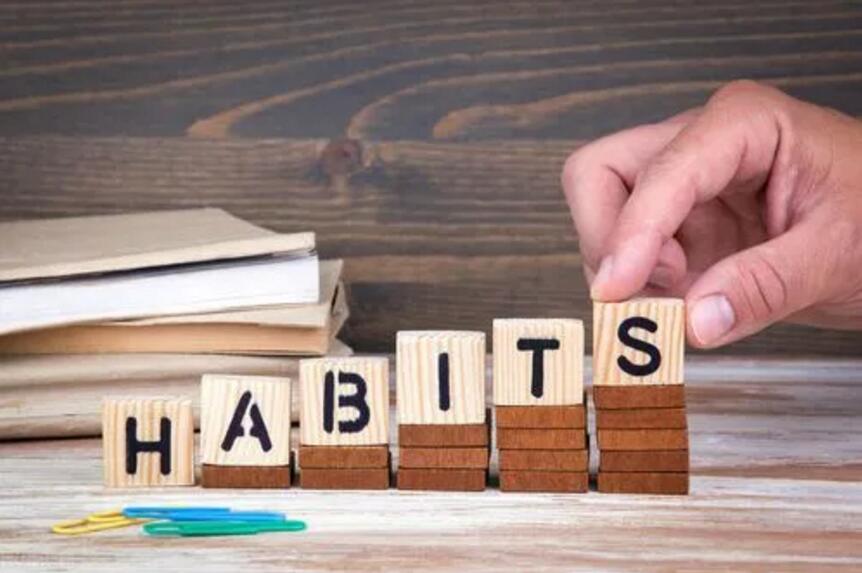如何养成习惯(三)
正文翻译

How do you build a habit?
如何养成习惯?

How do you build a habit?
如何养成习惯?
评论翻译
Micha Stawicki
Filters in your brain
When I was keeping my food journal, I carried sticky notes and a pen with me. Immediately after consumption, I noted down what I ate and drank. When I arrived at my computer, I copied those notes into a text file. Keeping records on sticky notes felt weird to me, so I trained myself to remember what I ate and, once I reached a computer, I dumped this information from my head into the file. I did that at first after each meal, then a few times a day, and finally I was able to keep in my head everything I ate on any given day and note it down in the file during a single session in the evening.
I kept my food journal for about 9 weeks and ditched this habit around 10th of March 2013. But today I can still recall everything I've consumed from the moment I wake up till the moment I go to bed.
As an example, today I ate an orange, five small slices of wholegrain bread with cheese, a peach, lunch (one pickle, some cabbage soup and a sauce with chicken meat), three more slices of bread with cheese and four slices of bread with jam. I drank two glasses of chicory coffee with a spoon of honey and a glass of coffee, all of them with milk.
I have filters in my brain that register my consumption. They work in the background. I don't need a conscious effort to remember what I eat. Whenever I want to recall my consumption, that data is "at hand". But don't ask me what I ate yesterday. I need to refer to the normal memory routine to get to that data.
So, if you track your habit, the attention of both your conscious and subconscious mind focuses on this activity. Your chances of success rise exponentially.
大脑中的过滤器
当我记食物方面的日记时,我随身带着便签和钢笔。吃完后,我立即记下我吃和喝的东西。当我到达电脑前,我把这些笔记复制到一个文本文件中。在便利贴上做记录对我来说很奇怪,所以我训练自己记住我吃了什么,一旦我接触到一台电脑,我就把这些信息从我的脑海中转储到文件中。起初,我在每顿饭后都这样做,然后一天做几次,最后,我能够记住我在任何一天吃的东西,并在晚上的某个时间段把它记录在文件中。
我记了大约9周的饮食日记,并在2013年3月10日左右改掉了这个习惯。但今天,我仍然能回忆起我从醒来到睡觉的那一刻所消耗的一切。
举个例子,今天我吃了一个橘子,五小片全麦奶酪面包,一个桃子,午餐(一份泡菜,一些卷心菜汤和一份鸡肉酱汁),还有三片奶酪面包和四片果酱面包。我喝了两杯菊苣咖啡,一勺蜂蜜和一杯咖啡,且都是加牛奶的。
我大脑中有记录我消耗的过滤器。他们在后台工作。我不需要有意识地记住我吃了什么。每当我想回忆我的消耗时,这些数据就“在手边”。但别问我昨天吃了什么。我需要引用正常的记忆程序来获取数据。
因此,如果你追踪你的习惯,你的意识和潜意识都会把注意力集中在这个行动上。你建立习惯的成功率成倍增加。
Data
The second biggest advantage of tracking is tangible data for analysis. We are so prone to lie to ourselves! When you keep everything in your head, fantasy and illusion are mixed up with the facts. You can justify any action: "Oh well, a cup of ice cream will not do much damage. It's so yummy, and you deserve a treat because you didn't eat much today anyway." Or: "C'mon treat yourself, you will burn it tomorrow in the morning workout."
If you don't know how much you ate or how many calories your average workout burns, such "arguments" from your subconscious seem logical and convincing. If you possess such data, your subconscious cannot pull most dirty tricks on you.
数据
跟踪的第二大优势是用于分析的有形数据。我们很容易对自己撒谎!当你把一切都记在脑子里时,幻想和幻觉就会和事实混在一起。你可以为任何行为辩护:“哦,好吧,一杯冰淇淋不会造成太大的损害。它很好吃,你应该得到一份款待,因为你今天吃得不多。”或者:“来吧,好好犒劳自己,你明天早上锻炼的时候会把它给燃烧掉。”
如果你不知道自己吃了多少,也不知道自己的平均运动消耗了多少卡路里,那么你潜意识中的这种“论据”似乎是合乎逻辑和令人信服的。如果你拥有这样的数据,你的潜意识就无法欺骗你。
Tracking/ developing a habit balance
The more comprehensive your tracking is, the more data you collect and the harder it is to cheat yourself I just tracked everything caloric that went into my mouth, but food journals may be more elaborate than that. You might track the number of calories, time of meals, your moods, and many more details.
Of course, the more comprehensive is your tracking, the more burdensome it is to keep. It's so much easier to mark a habit once a day in a tracking application than writing down what you ate, where you ate it, how long it took you and in what mood you were in.
I consider tracking an integral part of habit development.
Data driven analysis example
When I decided to overcome my shyness, it was tracking that saved me and ultimately helped me to succeed. My subconscious mind used the normal arsenal of tricks to discourage me from my new habit. It was sending soothing messages: "Don't worry, it's not that bad, you will do it next time, take it easy, it's not worth it anyway, this talking to strangers is really terrifying."
If not for my tracking, I would have believed those messages. But, several weeks into my habit, I took the sheets of paper I had been keeping my tracking on and I compared the habit of talking to strangers with other habits I started about the same time; a dozen or so. I had more minuses in case of talking to strangers, than in all other habits together.
Only then I really realized the real scope of my problem with introversion and changed my strategy. I downsized the habit at the beginning to simply making eye contact, later I started smiling to strangers and finally I began talking to them.
Thanks to tracking I didn't let my habit slip into the abyss of failure, where most New Year’s resolutions finish.
跟踪/培养习惯平衡
你的跟踪越全面,你收集的数据就越多,就越难欺骗自己。我只是跟踪了进入我嘴里的所有卡路里,但食品日记可能比这更详细。你可以追踪卡路里的数量、进餐时间、情绪以及更多细节。
当然,你的跟踪越全面,保存起来就越麻烦。毕竟每天在跟踪应用程序中标记一个习惯要比写下你吃了什么、在哪里吃、花了多长时间以及你的心情容易得多。
我认为跟踪是习惯养成的一个组成部分。
数据驱动分析实例
当我决定克服害羞时,正是追踪拯救了我,并最终帮助我成功。我的潜意识使用了常规的各种技巧来阻止我养成新习惯。它发出了安慰的信息:“别担心,没那么糟糕,你下次会做的,别紧张,反正不值得,跟陌生人说话真的很可怕。”
如果不是因为我的追踪,我会相信那些信息。但是,在我养成习惯的几周后,我拿着一直在跟踪的几张纸,将与陌生人交谈的习惯与我差不多在同一时间养成的其他习惯进行了比较;一打左右。与陌生人交谈,我的缺点比所有其他习惯加在一起还要多。
直到那时,我才真正意识到我内向问题的真正范围,并改变了我的策略。一开始我把这个习惯简化为眼神交流,后来我开始对陌生人微笑,最后我开始和他们说话。
多亏了追踪,我没有让我的习惯滑入失败的深渊,在那种情况下而大多数新年决心都以失败告终。
2. Streaks.
The scientist I mentioned before, BJ Fogg, designed a model that describes change in human behavior. In order get a behavior you need to have motivation, ability and a trigger (cue).
The cue is the simplest part of that model. The best idea is to make an established habit a cue for the new one.
Ability is not so complicated either. Your knowledge and/ or experience in a given area equates to your ability. No magical stuff, just sweat, tears and hustle.
Motivation seems to be the most difficult part and that's where streaks come into play.
The practice of building streaks—habits continuously maintained for a series of days— is well known. Jerry Seinfeld’s habit of coming up with a new joke every day and marking this fact on his wall calendar serves as an example. The motivational technique of streaks is also called "don't break up a chain".
We know about streaks, but we don't practice them often enough.
坚持
我之前提到的科学家BJ Fogg设计了一个模型来描述人类行为的变化。为了获得一种行为,你需要有动机、能力和触发器(暗示)。
暗示是该模型最简单的部分。最好的办法是把一个已经养成的习惯作为新习惯的暗示。
能力也不是那么复杂。你在某一领域的知识和/或经验等于你的能力。没有什么神奇的东西,只有汗水、眼泪和拼命的态度。
动机似乎是最困难的部分,这就是坚持发挥作用的地方。
建立坚持习惯的做法持续保持好些天,这是众所周知的。杰瑞·宋(Jerry Seinfeld)每天都会讲一个新笑话,并把这个笑话记在挂历上,就是一个例子。这种激励技巧也被称为“不要打破链条”。
我们知道坚持的方式,但我们没有经常练习。
Why do they work?
One aspect that is widely discussed is loss aversion. When you build a habit over days, weeks and months, you feel that not doing your habit the next day will "lose" you the time and effort investment you made so far. A wall calendar, or any other tracking tool, serves as a visual reminder of that.
From my own experience I can say that you draw confidence and self-esteem from building your streaks. I've written for at least 30 minutes every day for the last 913 days. Very few people can say that about themselves. I have this illusory feeling of being part of a special group.
Well, I suppose there are some folks who wrote every day for the last 1,000 days. But how many of them also did pullups for the last 858 days and kept a journal for the last 727 days?
This is the effect of gamification. We score "points" to feel better about ourselves. Maintaining your self-esteem is a powerful motivator.
Data driven confirmation
They used BJ Fogg's model to design their application and built a community around it. They have millions of users and their data analysis confirmed that the streak approach works. CEO, Tony Stubblebine, in explaining their philosophy put it aptly:
"One heroic week from you isn’t going to change your life, you need practices that you can keep up."
他们为什么有效?
广泛讨论的一个方面是损失厌恶。当你在几天、几周和几个月内养成习惯时,如果你不养成习惯,第二天就会“失去”到目前为止所投入的时间和精力。挂历或任何其他跟踪工具都可以作为视觉提醒。
根据我自己的经验,我可以说,你从建立自己的闪现(习惯)中获得了自信和自尊。在过去的913天里,我每天至少写作30分钟。很少有人能这样评价自己。我有一种错觉,觉得自己是某个特殊群体的一员。
嗯,我想在过去的1000天里,有些人每天都在写作。但是,他们中有多少人在最近的858天里做了引体向上,在过去的727天里记日记?
这就是游戏化的效果。我们得分是为了让自己感觉更好。保持自尊是一种强大的动力。
数据驱动确认
他们使用BJ Fogg的模型来设计他们的应用程序,并围绕它建立了一个社区。他们拥有无数用户,他们的数据分析证实了闪现方法的有效性。首席执行官托尼·斯塔布尔宾(Tony Stubblebine)在解释他们的理念时恰如其分地说:
“你英勇的一周不会改变你的生活,你需要的是你能坚持下去的练习。”
A foundation
Streaks have also one additional attribute which is unrecognized or taken for granted. In either case, I've never found it articulated: they solidify your habits.
If you maintain a streak of a daily habit, you do your routine more often and more regularly. It's especially important in the initial phase of forming your habit. If you don't track and have no visual reminder how far you are into your streak, you are more likely to skip your discipline on a given day and more prone to discouragement. An erratic manner of performing your routine for "one heroic week" doesn't support habit development or its sustainability.
The last advantage of streak is also highly undervalued:
You identify with them
Recently the stress has taken its toll. I broke my streak of reviewing my personal mission statement after 800 days. After well over 500 days, I didn't study the Bible one day. I maintained my streak for 899 days only to forget about doing a pushups series one day. I love to read works written by saints, yet I missed a day after maintaining 800+ day streak.
It doesn't matter. My habits are ingrained into my days and into the core of who I am. In the last 914 days I reviewed my personal mission statement 911 times, I did my pushups 910 times and read saints' work 913 times. An occasional hiccup means nothing. My streaks helped me to build my habits to the point where they are me.
根基
坚持还有一个额外的属性,无法识别或被视为理所当然。在这两种情况下,我从来没有发现它能明确固化你的习惯。
如果你保持一种日常习惯,你就会更经常、更有规律地做你的日常工作。这在养成习惯的初始阶段尤为重要。如果你不跟踪,也没有视觉提示,你的连胜距离有多远,你更有可能在给定的一天跳过你的训练,更容易气馁。在“英勇的一周”里,以一种不稳定的方式完成你的日常工作,既不利于习惯的养成,也不利于习惯的可持续性。
坚持的最后一个优势也被高度低估了:
你认同他们
最近,压力已经造成了损害。我打破了回顾个人使命宣言的习惯。500多天过去了,我一天都没有学习圣经。我坚持了899天,只是为了有一天忘记做引体向上。我喜欢读圣徒们写的作品,但在坚持800多天之后,错失一天。
没关系。我的习惯深深扎根于我的生活和我是谁的核心。在过去的914天里,我复习了911遍我的个人使命宣言,做了910次俯卧撑,读了913遍圣徒的作品。偶尔打嗝没什么意义。我的坚持帮助我养成习惯,成为我的本能。
IV. frxWORK
How to build a habit then? Here is the frxwork I used with success to develop dozens of habits:
Decide what habit do you want.
Be specific. Design it. How often? When? Where? What will you do? How many repetitions? For how long?
Perform your discipline at least once a day.
Weekly and monthly habits have their place too, but if you cannot build and maintain a daily habit, a weekly one will be a nightmare to develop. Learn the art of habit development in the most efficient way, via daily activity, and only then start more ambitious projects.
Track your habit daily.
"You can’t change what you don’t measure." — Tony Stubblebine
That's exactly my experience. When I measure my habits, when I track them, the process of habit development is smooth and efficient (well, compared to NOT tracking, of course). Make sure that the tracking method you choose serves its purpose, but doesn't become an end unto itself. You shouldn't spend too much time and attention on tracking. Remember what your main goal is: building a new habit.
框架
那么如何养成习惯呢?以下是我成功培养几十个习惯的框架:
决定你想要什么样的习惯。
具体点,设计它,多久?什么时候做?在哪里做?你会怎么做?重复多少次?要多久?
每天至少执行一次纪律。
每周和每月的习惯也有它们的位置,但是如果你不能建立并保持每天的习惯,每周的习惯将会是一场噩梦。通过日常活动,以最有效的方式学习习惯养成的艺术,只有这样,然后才开始更艰巨的项目。
每天追踪你的习惯。
“你不能改变你没有去衡量的东西。”-托尼·斯塔布尔宾
这正是我的经验。当我衡量我的习惯时,当我跟踪它们时,习惯发展的过程是平稳而高效的(当然,与不跟踪相比)。确保你选择的跟踪方法符合其目的,但不会成为目的。你不应该在跟踪上花费太多的时间和注意力。记住你的主要目标是:养成新习惯。
They will help you with your motivation like nothing else. In the end, they will integrate your habits into your personality.
Continuous tracking is your feedback loop. Your habit is not set in stone.
I did a single series of consecutive pushups for years. First I struggled with consistency, so I coupled this activity with my morning prayer. That instantly helped.
Then I modified this habit and started doing various pushups; my workout started to be more interesting, I had more records to beat (diamond, legs-elevated, wide-grip pushups etc.) and I used less time for exercises (doing 100 pushups takes several minutes). I became so strong, that even the most difficult kind of pushups took me several minutes.
Then I switched to pullups. I can do quite a lot of them, but I can't do them for longer than two minutes. This is my ideal workout.
This habit morphed throughout the years, but the underpinning stayed the same: I couple my morning prayer with it; it's very short and very intensive; I can track the number of repetitions and motivate myself by beating records.
The purpose behind the habit stayed the same and it's still fulfilled: to train my mind, body and soul first thing in the morning.
The challenge
I declare that it's impossible to fail using my frxwork. I have never failed using it.
他们将帮助你激励自己,这与其他任何事情都不一样。最终,他们会将你的习惯融入你的个性。
持续跟踪是你的反馈循环。你的习惯不是一成不变的。
多年来,我连续做了好几年的俯卧撑。首先,我努力保持一致性,所以我把这项活动与我的晨祷结合起来。这立即起到了作用。
然后我改变了这个习惯,开始做各种俯卧撑;我的锻炼开始变得更有趣,我有更多的记录要打破(菱形、抬腿、大抓地力俯卧撑等),我用更少的时间锻炼(做100个俯卧撑需要几分钟)。我变得非常强壮,以至于即使是最困难的俯卧撑也花几分钟。
然后我换成了引体向上。我可以做很多,但我不能超过两分钟。这是我理想的锻炼方式。
这一习惯多年来一直在演变,但其基础保持不变:我把早上的祈祷和它结合起来;它很短很密集;我可以追踪重复次数,并通过打破记录来激励自己。
这个习惯背后的目的保持不变,它仍然实现了:早上第一件事就是训练我的思想、身体和灵魂。
挑战
我声明,使用我的框架是不可能失败的。我使用它也从来没有失败过。
Nela Canovic
You repeat certain behaviors consistently over time.
It helps if you don’t force yourself to make decisions on whether to practice a habit every day or not. It helps if you don’t overthink it. And it certainly helps to just do it, even if you don’t feel like it.
To form good habits, I recommend that you focus on these five things:
Keep it very simple.
Every habit we’d like to acquire needs self-discipline, time, and repetition. You may want to start reading more effectively, or stop eating a big dinner, or get more sleep. The key to keeping a good habit stick is to make it simple so you don’t find it intimidating, exhausting, and overwhelming. You can start with tiny steps. Set a timer for 15 minutes and see if you can read 20 pages of a book. Have a snack in the mid-afternoon so you’re not starving by dinnertime. Start going to bed a bit earlier than usual to give yourself time to de-stress and relax.
Maximize willpower early in the day.
When we start the day, we are often overwhelmed with the amount of things we need to do, so we tend to procrastinate on some of those things and postpone them for later in the day. That goes for new habits too. But what a missed opportunity! Think of it this way. We all have a finite amount of willpower that takes us through the day, so if you want to focus on your top priority (your new habit) work on it early. Practice a new skill before lunchtime while you’re still energized and focused on your top goals. That could be writing one paragraph of a short story or finishing one chapter of a textbook while jotting down notes. Don’t leave this activity for late at night when you’re mentally exhausted.
随着时间的推移,你会不断重复某些行为。
如果你不强迫自己决定是否每天练习一个习惯,这会有所帮助。如果你不去想得太多,这会有帮助。即使你不喜欢,只要这样做就当然会有帮助。
为了养成好习惯,我建议你关注以下五件事:
保持简单。
我们想要养成的每一个习惯都需要自律、时间和重复。你可能想开始更有效地阅读,或者停止吃大餐,或者多睡一会。保持一个好习惯的关键是让它变得简单,这样你就不会觉得它吓人、让人筋疲力尽、让人难以忍受。你可以从很小的步骤开始。设置一个15分钟的计时器,看看你是否能阅读一本书的20页。下午吃点零食,这样你就不会在晚饭前挨饿。开始比平时早一点睡觉,给自己时间减压和放松。
在一天的早些时候最大限度地发挥意志力。
当我们开始一天的时候,我们经常被我们需要做的事情弄得不知所措,所以我们倾向于拖延其中一些事情,并把它们推迟到一天的晚些时候去做。这也适用于新习惯。但这真是错失良机!这样想吧。我们每天都有有限的意志力,所以如果你想把注意力集中在你最重要的事情上(你的新习惯),那就早点开始吧。在午餐前练习一项新技能,同时你仍然精力充沛,专注于你的最高目标。这可以是写一个短篇故事的一段或学习教科书的一章,同时记笔记。不要把这项活动留到深夜,因为那是你已经精神疲惫。
Stick to a schedule.
This part is critical. It’s much less likely you will make any habit stick if you just practice it once or twice a week. Why? Because if you do, your brain will start thinking this is an optional activity, something you just do on the side. Instead, you’ll get better results if you starting doing it more frequently so you brain gets accustomed to it and eventually adopts it as a regular part of the day. How can you do this? Schedule it in. Find a block of time (preferably earlier in the day) to work on your habit so that you’ll be successful at it. Mark it in your daily planner, or add it to your mobile phone monthly calendar, then set a notification to remind you an hour or two ahead of time when you should practice it.
Instead of saying, “I can’t,” say “Why not try?”
按照计划行事
这一部分至关重要。如果你每周只练习一到两次,你就不太可能坚持任何习惯。为什么?因为如果你这样做,你的大脑会开始认为这是一个可选的活动,你只是顺带做。相反,如果你开始更频繁地这样做,你会得到更好的结果,这样你的大脑就会习惯它,并最终将其作为一天中的常规部分。你怎么能这么做?安排时间。找一段时间(最好是在一天的早些时候)来养成你的习惯,这样你就会成功地做到这一点。在你的每日计划表中标记它,或者将其添加到你的手机月历中,然后设置一个通知,提醒你应该提前一两个小时练习。
与其说“我做不到”,不如说“为什么不试试?”
It’s a small and subtle shift in your attitude but it can reap big results over time, especially if you keep practicing it. You know the feeling when you’re trying to do something new and it’s just not going well? The first instinctive reaction is to say, I can’t! And that’s a human reaction. But the key here is to replace a negative statement with an open-ended and positive one. When we say, Why not try? we give ourselves more power to make a positive change in our life. We leave some space open for possibilities, instead of shutting the door in our own face. It’s a matter of seeing things as doable and realistic, instead of making them appear abstract and impossible to achieve.
Resist the urge to quit.
The writer Seth Godin said, "Never quit something with great long-term potential just because you can't deal with the stress of the moment." It’s important to stop for a minute and identify the stress you’re feeling and where it’s coming from. If you’re stressed out about keeping up with a new habit, figure out why. Maybe it’s not easy to stick to your diet if your partner wants to eat restaurant food three times a week. Maybe your ego finds it tough to deal with not being the best in a kickboxing class you recently participated in. Fight the urge to give up when things get tough. Know the difference between what feels hard to do right now and what's good for you in the long run. And think ahead — by building good habits you are creating a future version of you that will make you feel proud!
这是态度上的一个小而微妙的转变,但随着时间的推移,它可以收获很大的结果,尤其是如果你坚持练习的话。你知道当你尝试做一些新的事情但进展不顺利时的感觉吗?第一个本能反应是说,我完成不了!这是人类的反应。但这里的关键是用一个开放和积极的声明来取代消极的声明。当我们说,为什么不试试?我们给自己更多的力量,让自己的生活发生积极的变化。我们为各种可能性留有空间,而不是当着自己的面关上门。这是一个将事情视为可行和现实的问题,而不是让它们看起来抽象和不可能实现。
克制想要放弃的冲动
作家塞思·戈丁(SethGodin)说:“永远不要仅仅因为你无法应对当下的压力就放弃那些具有巨大长期潜力的事情。”重要的是停下来一分钟,确定你感觉到的压力以及压力来自哪里。如果你对保持一个新习惯感到压力很大,找出原因。如果你的伴侣想一周下三次馆子,那么坚持你的饮食可能并不容易。也许你的自尊心发现,在最近参加的跆拳道课上,你很难做到最好。当事情变得困难时,与放弃的冲动作斗争。知道现在觉得很难做的事情和从长远来看对你有好处的事情之间的区别。提前想想—通过养成好习惯,你正在创造一个让你感到自豪的未来!
Filters in your brain
When I was keeping my food journal, I carried sticky notes and a pen with me. Immediately after consumption, I noted down what I ate and drank. When I arrived at my computer, I copied those notes into a text file. Keeping records on sticky notes felt weird to me, so I trained myself to remember what I ate and, once I reached a computer, I dumped this information from my head into the file. I did that at first after each meal, then a few times a day, and finally I was able to keep in my head everything I ate on any given day and note it down in the file during a single session in the evening.
I kept my food journal for about 9 weeks and ditched this habit around 10th of March 2013. But today I can still recall everything I've consumed from the moment I wake up till the moment I go to bed.
As an example, today I ate an orange, five small slices of wholegrain bread with cheese, a peach, lunch (one pickle, some cabbage soup and a sauce with chicken meat), three more slices of bread with cheese and four slices of bread with jam. I drank two glasses of chicory coffee with a spoon of honey and a glass of coffee, all of them with milk.
I have filters in my brain that register my consumption. They work in the background. I don't need a conscious effort to remember what I eat. Whenever I want to recall my consumption, that data is "at hand". But don't ask me what I ate yesterday. I need to refer to the normal memory routine to get to that data.
So, if you track your habit, the attention of both your conscious and subconscious mind focuses on this activity. Your chances of success rise exponentially.
大脑中的过滤器
当我记食物方面的日记时,我随身带着便签和钢笔。吃完后,我立即记下我吃和喝的东西。当我到达电脑前,我把这些笔记复制到一个文本文件中。在便利贴上做记录对我来说很奇怪,所以我训练自己记住我吃了什么,一旦我接触到一台电脑,我就把这些信息从我的脑海中转储到文件中。起初,我在每顿饭后都这样做,然后一天做几次,最后,我能够记住我在任何一天吃的东西,并在晚上的某个时间段把它记录在文件中。
我记了大约9周的饮食日记,并在2013年3月10日左右改掉了这个习惯。但今天,我仍然能回忆起我从醒来到睡觉的那一刻所消耗的一切。
举个例子,今天我吃了一个橘子,五小片全麦奶酪面包,一个桃子,午餐(一份泡菜,一些卷心菜汤和一份鸡肉酱汁),还有三片奶酪面包和四片果酱面包。我喝了两杯菊苣咖啡,一勺蜂蜜和一杯咖啡,且都是加牛奶的。
我大脑中有记录我消耗的过滤器。他们在后台工作。我不需要有意识地记住我吃了什么。每当我想回忆我的消耗时,这些数据就“在手边”。但别问我昨天吃了什么。我需要引用正常的记忆程序来获取数据。
因此,如果你追踪你的习惯,你的意识和潜意识都会把注意力集中在这个行动上。你建立习惯的成功率成倍增加。
Data
The second biggest advantage of tracking is tangible data for analysis. We are so prone to lie to ourselves! When you keep everything in your head, fantasy and illusion are mixed up with the facts. You can justify any action: "Oh well, a cup of ice cream will not do much damage. It's so yummy, and you deserve a treat because you didn't eat much today anyway." Or: "C'mon treat yourself, you will burn it tomorrow in the morning workout."
If you don't know how much you ate or how many calories your average workout burns, such "arguments" from your subconscious seem logical and convincing. If you possess such data, your subconscious cannot pull most dirty tricks on you.
数据
跟踪的第二大优势是用于分析的有形数据。我们很容易对自己撒谎!当你把一切都记在脑子里时,幻想和幻觉就会和事实混在一起。你可以为任何行为辩护:“哦,好吧,一杯冰淇淋不会造成太大的损害。它很好吃,你应该得到一份款待,因为你今天吃得不多。”或者:“来吧,好好犒劳自己,你明天早上锻炼的时候会把它给燃烧掉。”
如果你不知道自己吃了多少,也不知道自己的平均运动消耗了多少卡路里,那么你潜意识中的这种“论据”似乎是合乎逻辑和令人信服的。如果你拥有这样的数据,你的潜意识就无法欺骗你。
Tracking/ developing a habit balance
The more comprehensive your tracking is, the more data you collect and the harder it is to cheat yourself I just tracked everything caloric that went into my mouth, but food journals may be more elaborate than that. You might track the number of calories, time of meals, your moods, and many more details.
Of course, the more comprehensive is your tracking, the more burdensome it is to keep. It's so much easier to mark a habit once a day in a tracking application than writing down what you ate, where you ate it, how long it took you and in what mood you were in.
I consider tracking an integral part of habit development.
Data driven analysis example
When I decided to overcome my shyness, it was tracking that saved me and ultimately helped me to succeed. My subconscious mind used the normal arsenal of tricks to discourage me from my new habit. It was sending soothing messages: "Don't worry, it's not that bad, you will do it next time, take it easy, it's not worth it anyway, this talking to strangers is really terrifying."
If not for my tracking, I would have believed those messages. But, several weeks into my habit, I took the sheets of paper I had been keeping my tracking on and I compared the habit of talking to strangers with other habits I started about the same time; a dozen or so. I had more minuses in case of talking to strangers, than in all other habits together.
Only then I really realized the real scope of my problem with introversion and changed my strategy. I downsized the habit at the beginning to simply making eye contact, later I started smiling to strangers and finally I began talking to them.
Thanks to tracking I didn't let my habit slip into the abyss of failure, where most New Year’s resolutions finish.
跟踪/培养习惯平衡
你的跟踪越全面,你收集的数据就越多,就越难欺骗自己。我只是跟踪了进入我嘴里的所有卡路里,但食品日记可能比这更详细。你可以追踪卡路里的数量、进餐时间、情绪以及更多细节。
当然,你的跟踪越全面,保存起来就越麻烦。毕竟每天在跟踪应用程序中标记一个习惯要比写下你吃了什么、在哪里吃、花了多长时间以及你的心情容易得多。
我认为跟踪是习惯养成的一个组成部分。
数据驱动分析实例
当我决定克服害羞时,正是追踪拯救了我,并最终帮助我成功。我的潜意识使用了常规的各种技巧来阻止我养成新习惯。它发出了安慰的信息:“别担心,没那么糟糕,你下次会做的,别紧张,反正不值得,跟陌生人说话真的很可怕。”
如果不是因为我的追踪,我会相信那些信息。但是,在我养成习惯的几周后,我拿着一直在跟踪的几张纸,将与陌生人交谈的习惯与我差不多在同一时间养成的其他习惯进行了比较;一打左右。与陌生人交谈,我的缺点比所有其他习惯加在一起还要多。
直到那时,我才真正意识到我内向问题的真正范围,并改变了我的策略。一开始我把这个习惯简化为眼神交流,后来我开始对陌生人微笑,最后我开始和他们说话。
多亏了追踪,我没有让我的习惯滑入失败的深渊,在那种情况下而大多数新年决心都以失败告终。
2. Streaks.
The scientist I mentioned before, BJ Fogg, designed a model that describes change in human behavior. In order get a behavior you need to have motivation, ability and a trigger (cue).
The cue is the simplest part of that model. The best idea is to make an established habit a cue for the new one.
Ability is not so complicated either. Your knowledge and/ or experience in a given area equates to your ability. No magical stuff, just sweat, tears and hustle.
Motivation seems to be the most difficult part and that's where streaks come into play.
The practice of building streaks—habits continuously maintained for a series of days— is well known. Jerry Seinfeld’s habit of coming up with a new joke every day and marking this fact on his wall calendar serves as an example. The motivational technique of streaks is also called "don't break up a chain".
We know about streaks, but we don't practice them often enough.
坚持
我之前提到的科学家BJ Fogg设计了一个模型来描述人类行为的变化。为了获得一种行为,你需要有动机、能力和触发器(暗示)。
暗示是该模型最简单的部分。最好的办法是把一个已经养成的习惯作为新习惯的暗示。
能力也不是那么复杂。你在某一领域的知识和/或经验等于你的能力。没有什么神奇的东西,只有汗水、眼泪和拼命的态度。
动机似乎是最困难的部分,这就是坚持发挥作用的地方。
建立坚持习惯的做法持续保持好些天,这是众所周知的。杰瑞·宋(Jerry Seinfeld)每天都会讲一个新笑话,并把这个笑话记在挂历上,就是一个例子。这种激励技巧也被称为“不要打破链条”。
我们知道坚持的方式,但我们没有经常练习。
Why do they work?
One aspect that is widely discussed is loss aversion. When you build a habit over days, weeks and months, you feel that not doing your habit the next day will "lose" you the time and effort investment you made so far. A wall calendar, or any other tracking tool, serves as a visual reminder of that.
From my own experience I can say that you draw confidence and self-esteem from building your streaks. I've written for at least 30 minutes every day for the last 913 days. Very few people can say that about themselves. I have this illusory feeling of being part of a special group.
Well, I suppose there are some folks who wrote every day for the last 1,000 days. But how many of them also did pullups for the last 858 days and kept a journal for the last 727 days?
This is the effect of gamification. We score "points" to feel better about ourselves. Maintaining your self-esteem is a powerful motivator.
Data driven confirmation
They used BJ Fogg's model to design their application and built a community around it. They have millions of users and their data analysis confirmed that the streak approach works. CEO, Tony Stubblebine, in explaining their philosophy put it aptly:
"One heroic week from you isn’t going to change your life, you need practices that you can keep up."
他们为什么有效?
广泛讨论的一个方面是损失厌恶。当你在几天、几周和几个月内养成习惯时,如果你不养成习惯,第二天就会“失去”到目前为止所投入的时间和精力。挂历或任何其他跟踪工具都可以作为视觉提醒。
根据我自己的经验,我可以说,你从建立自己的闪现(习惯)中获得了自信和自尊。在过去的913天里,我每天至少写作30分钟。很少有人能这样评价自己。我有一种错觉,觉得自己是某个特殊群体的一员。
嗯,我想在过去的1000天里,有些人每天都在写作。但是,他们中有多少人在最近的858天里做了引体向上,在过去的727天里记日记?
这就是游戏化的效果。我们得分是为了让自己感觉更好。保持自尊是一种强大的动力。
数据驱动确认
他们使用BJ Fogg的模型来设计他们的应用程序,并围绕它建立了一个社区。他们拥有无数用户,他们的数据分析证实了闪现方法的有效性。首席执行官托尼·斯塔布尔宾(Tony Stubblebine)在解释他们的理念时恰如其分地说:
“你英勇的一周不会改变你的生活,你需要的是你能坚持下去的练习。”
A foundation
Streaks have also one additional attribute which is unrecognized or taken for granted. In either case, I've never found it articulated: they solidify your habits.
If you maintain a streak of a daily habit, you do your routine more often and more regularly. It's especially important in the initial phase of forming your habit. If you don't track and have no visual reminder how far you are into your streak, you are more likely to skip your discipline on a given day and more prone to discouragement. An erratic manner of performing your routine for "one heroic week" doesn't support habit development or its sustainability.
The last advantage of streak is also highly undervalued:
You identify with them
Recently the stress has taken its toll. I broke my streak of reviewing my personal mission statement after 800 days. After well over 500 days, I didn't study the Bible one day. I maintained my streak for 899 days only to forget about doing a pushups series one day. I love to read works written by saints, yet I missed a day after maintaining 800+ day streak.
It doesn't matter. My habits are ingrained into my days and into the core of who I am. In the last 914 days I reviewed my personal mission statement 911 times, I did my pushups 910 times and read saints' work 913 times. An occasional hiccup means nothing. My streaks helped me to build my habits to the point where they are me.
根基
坚持还有一个额外的属性,无法识别或被视为理所当然。在这两种情况下,我从来没有发现它能明确固化你的习惯。
如果你保持一种日常习惯,你就会更经常、更有规律地做你的日常工作。这在养成习惯的初始阶段尤为重要。如果你不跟踪,也没有视觉提示,你的连胜距离有多远,你更有可能在给定的一天跳过你的训练,更容易气馁。在“英勇的一周”里,以一种不稳定的方式完成你的日常工作,既不利于习惯的养成,也不利于习惯的可持续性。
坚持的最后一个优势也被高度低估了:
你认同他们
最近,压力已经造成了损害。我打破了回顾个人使命宣言的习惯。500多天过去了,我一天都没有学习圣经。我坚持了899天,只是为了有一天忘记做引体向上。我喜欢读圣徒们写的作品,但在坚持800多天之后,错失一天。
没关系。我的习惯深深扎根于我的生活和我是谁的核心。在过去的914天里,我复习了911遍我的个人使命宣言,做了910次俯卧撑,读了913遍圣徒的作品。偶尔打嗝没什么意义。我的坚持帮助我养成习惯,成为我的本能。
IV. frxWORK
How to build a habit then? Here is the frxwork I used with success to develop dozens of habits:
Decide what habit do you want.
Be specific. Design it. How often? When? Where? What will you do? How many repetitions? For how long?
Perform your discipline at least once a day.
Weekly and monthly habits have their place too, but if you cannot build and maintain a daily habit, a weekly one will be a nightmare to develop. Learn the art of habit development in the most efficient way, via daily activity, and only then start more ambitious projects.
Track your habit daily.
"You can’t change what you don’t measure." — Tony Stubblebine
That's exactly my experience. When I measure my habits, when I track them, the process of habit development is smooth and efficient (well, compared to NOT tracking, of course). Make sure that the tracking method you choose serves its purpose, but doesn't become an end unto itself. You shouldn't spend too much time and attention on tracking. Remember what your main goal is: building a new habit.
框架
那么如何养成习惯呢?以下是我成功培养几十个习惯的框架:
决定你想要什么样的习惯。
具体点,设计它,多久?什么时候做?在哪里做?你会怎么做?重复多少次?要多久?
每天至少执行一次纪律。
每周和每月的习惯也有它们的位置,但是如果你不能建立并保持每天的习惯,每周的习惯将会是一场噩梦。通过日常活动,以最有效的方式学习习惯养成的艺术,只有这样,然后才开始更艰巨的项目。
每天追踪你的习惯。
“你不能改变你没有去衡量的东西。”-托尼·斯塔布尔宾
这正是我的经验。当我衡量我的习惯时,当我跟踪它们时,习惯发展的过程是平稳而高效的(当然,与不跟踪相比)。确保你选择的跟踪方法符合其目的,但不会成为目的。你不应该在跟踪上花费太多的时间和注意力。记住你的主要目标是:养成新习惯。
They will help you with your motivation like nothing else. In the end, they will integrate your habits into your personality.
Continuous tracking is your feedback loop. Your habit is not set in stone.
I did a single series of consecutive pushups for years. First I struggled with consistency, so I coupled this activity with my morning prayer. That instantly helped.
Then I modified this habit and started doing various pushups; my workout started to be more interesting, I had more records to beat (diamond, legs-elevated, wide-grip pushups etc.) and I used less time for exercises (doing 100 pushups takes several minutes). I became so strong, that even the most difficult kind of pushups took me several minutes.
Then I switched to pullups. I can do quite a lot of them, but I can't do them for longer than two minutes. This is my ideal workout.
This habit morphed throughout the years, but the underpinning stayed the same: I couple my morning prayer with it; it's very short and very intensive; I can track the number of repetitions and motivate myself by beating records.
The purpose behind the habit stayed the same and it's still fulfilled: to train my mind, body and soul first thing in the morning.
The challenge
I declare that it's impossible to fail using my frxwork. I have never failed using it.
他们将帮助你激励自己,这与其他任何事情都不一样。最终,他们会将你的习惯融入你的个性。
持续跟踪是你的反馈循环。你的习惯不是一成不变的。
多年来,我连续做了好几年的俯卧撑。首先,我努力保持一致性,所以我把这项活动与我的晨祷结合起来。这立即起到了作用。
然后我改变了这个习惯,开始做各种俯卧撑;我的锻炼开始变得更有趣,我有更多的记录要打破(菱形、抬腿、大抓地力俯卧撑等),我用更少的时间锻炼(做100个俯卧撑需要几分钟)。我变得非常强壮,以至于即使是最困难的俯卧撑也花几分钟。
然后我换成了引体向上。我可以做很多,但我不能超过两分钟。这是我理想的锻炼方式。
这一习惯多年来一直在演变,但其基础保持不变:我把早上的祈祷和它结合起来;它很短很密集;我可以追踪重复次数,并通过打破记录来激励自己。
这个习惯背后的目的保持不变,它仍然实现了:早上第一件事就是训练我的思想、身体和灵魂。
挑战
我声明,使用我的框架是不可能失败的。我使用它也从来没有失败过。
Nela Canovic
You repeat certain behaviors consistently over time.
It helps if you don’t force yourself to make decisions on whether to practice a habit every day or not. It helps if you don’t overthink it. And it certainly helps to just do it, even if you don’t feel like it.
To form good habits, I recommend that you focus on these five things:
Keep it very simple.
Every habit we’d like to acquire needs self-discipline, time, and repetition. You may want to start reading more effectively, or stop eating a big dinner, or get more sleep. The key to keeping a good habit stick is to make it simple so you don’t find it intimidating, exhausting, and overwhelming. You can start with tiny steps. Set a timer for 15 minutes and see if you can read 20 pages of a book. Have a snack in the mid-afternoon so you’re not starving by dinnertime. Start going to bed a bit earlier than usual to give yourself time to de-stress and relax.
Maximize willpower early in the day.
When we start the day, we are often overwhelmed with the amount of things we need to do, so we tend to procrastinate on some of those things and postpone them for later in the day. That goes for new habits too. But what a missed opportunity! Think of it this way. We all have a finite amount of willpower that takes us through the day, so if you want to focus on your top priority (your new habit) work on it early. Practice a new skill before lunchtime while you’re still energized and focused on your top goals. That could be writing one paragraph of a short story or finishing one chapter of a textbook while jotting down notes. Don’t leave this activity for late at night when you’re mentally exhausted.
随着时间的推移,你会不断重复某些行为。
如果你不强迫自己决定是否每天练习一个习惯,这会有所帮助。如果你不去想得太多,这会有帮助。即使你不喜欢,只要这样做就当然会有帮助。
为了养成好习惯,我建议你关注以下五件事:
保持简单。
我们想要养成的每一个习惯都需要自律、时间和重复。你可能想开始更有效地阅读,或者停止吃大餐,或者多睡一会。保持一个好习惯的关键是让它变得简单,这样你就不会觉得它吓人、让人筋疲力尽、让人难以忍受。你可以从很小的步骤开始。设置一个15分钟的计时器,看看你是否能阅读一本书的20页。下午吃点零食,这样你就不会在晚饭前挨饿。开始比平时早一点睡觉,给自己时间减压和放松。
在一天的早些时候最大限度地发挥意志力。
当我们开始一天的时候,我们经常被我们需要做的事情弄得不知所措,所以我们倾向于拖延其中一些事情,并把它们推迟到一天的晚些时候去做。这也适用于新习惯。但这真是错失良机!这样想吧。我们每天都有有限的意志力,所以如果你想把注意力集中在你最重要的事情上(你的新习惯),那就早点开始吧。在午餐前练习一项新技能,同时你仍然精力充沛,专注于你的最高目标。这可以是写一个短篇故事的一段或学习教科书的一章,同时记笔记。不要把这项活动留到深夜,因为那是你已经精神疲惫。
Stick to a schedule.
This part is critical. It’s much less likely you will make any habit stick if you just practice it once or twice a week. Why? Because if you do, your brain will start thinking this is an optional activity, something you just do on the side. Instead, you’ll get better results if you starting doing it more frequently so you brain gets accustomed to it and eventually adopts it as a regular part of the day. How can you do this? Schedule it in. Find a block of time (preferably earlier in the day) to work on your habit so that you’ll be successful at it. Mark it in your daily planner, or add it to your mobile phone monthly calendar, then set a notification to remind you an hour or two ahead of time when you should practice it.
Instead of saying, “I can’t,” say “Why not try?”
按照计划行事
这一部分至关重要。如果你每周只练习一到两次,你就不太可能坚持任何习惯。为什么?因为如果你这样做,你的大脑会开始认为这是一个可选的活动,你只是顺带做。相反,如果你开始更频繁地这样做,你会得到更好的结果,这样你的大脑就会习惯它,并最终将其作为一天中的常规部分。你怎么能这么做?安排时间。找一段时间(最好是在一天的早些时候)来养成你的习惯,这样你就会成功地做到这一点。在你的每日计划表中标记它,或者将其添加到你的手机月历中,然后设置一个通知,提醒你应该提前一两个小时练习。
与其说“我做不到”,不如说“为什么不试试?”
It’s a small and subtle shift in your attitude but it can reap big results over time, especially if you keep practicing it. You know the feeling when you’re trying to do something new and it’s just not going well? The first instinctive reaction is to say, I can’t! And that’s a human reaction. But the key here is to replace a negative statement with an open-ended and positive one. When we say, Why not try? we give ourselves more power to make a positive change in our life. We leave some space open for possibilities, instead of shutting the door in our own face. It’s a matter of seeing things as doable and realistic, instead of making them appear abstract and impossible to achieve.
Resist the urge to quit.
The writer Seth Godin said, "Never quit something with great long-term potential just because you can't deal with the stress of the moment." It’s important to stop for a minute and identify the stress you’re feeling and where it’s coming from. If you’re stressed out about keeping up with a new habit, figure out why. Maybe it’s not easy to stick to your diet if your partner wants to eat restaurant food three times a week. Maybe your ego finds it tough to deal with not being the best in a kickboxing class you recently participated in. Fight the urge to give up when things get tough. Know the difference between what feels hard to do right now and what's good for you in the long run. And think ahead — by building good habits you are creating a future version of you that will make you feel proud!
这是态度上的一个小而微妙的转变,但随着时间的推移,它可以收获很大的结果,尤其是如果你坚持练习的话。你知道当你尝试做一些新的事情但进展不顺利时的感觉吗?第一个本能反应是说,我完成不了!这是人类的反应。但这里的关键是用一个开放和积极的声明来取代消极的声明。当我们说,为什么不试试?我们给自己更多的力量,让自己的生活发生积极的变化。我们为各种可能性留有空间,而不是当着自己的面关上门。这是一个将事情视为可行和现实的问题,而不是让它们看起来抽象和不可能实现。
克制想要放弃的冲动
作家塞思·戈丁(SethGodin)说:“永远不要仅仅因为你无法应对当下的压力就放弃那些具有巨大长期潜力的事情。”重要的是停下来一分钟,确定你感觉到的压力以及压力来自哪里。如果你对保持一个新习惯感到压力很大,找出原因。如果你的伴侣想一周下三次馆子,那么坚持你的饮食可能并不容易。也许你的自尊心发现,在最近参加的跆拳道课上,你很难做到最好。当事情变得困难时,与放弃的冲动作斗争。知道现在觉得很难做的事情和从长远来看对你有好处的事情之间的区别。提前想想—通过养成好习惯,你正在创造一个让你感到自豪的未来!
关键词:
习惯









